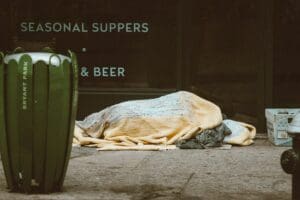Opinion by Amy K. Matsui
The new Netflix series “Maid” — largely based on the bestselling memoir of the same name by Stephanie Land — tells a story familiar to many mothers fighting to keep their heads above water. Fleeing a violent partner while trying to do right by her child, Alex (portrayed by Margaret Qualley) finds navigating the requirements of emergency shelters and public programs a Kafkaesque maze that adds to the trauma of her own poverty. “I need a job to prove that I need day care in order to get a job?” laments Alex while filing for child care subsidies. “What kind of f**kery is that?”
Single mothers like the character of Alex have often been demonized for relying on public benefits like child care subsidies and nutritional assistance, especially if they are Black or brown. And many policymakers seem to go to great lengths to make relying on public programs the most difficult and humiliating of propositions. Whether it’s providing benefit levels so low that people are virtually guaranteed to run out of food by the end of the month, or requiring in-person visits to benefits offices that aren’t accessible by public transportation, or mandating online reporting on websites that don’t work on mobile phones — the goal is clearly to discourage the use of public benefits, rather than to provide a fallback plan when families hit hard times.
Even in the midst of historic levels of unemployment precipitated by a pandemic, a shocking number of states turned down the federal boost to unemployment benefits. Centrist Democrats have floated some “means-testing” proposals that would narrow the cohort of people eligible for free community college or child care as Congress debates the contours of the Build Back Better legislation. And West Virginia Sen. Joe Manchin explicitly suggested adding work requirements to the expanded Child Tax Credit (CTC). But as both “Maid” and the lived experience of any family in poverty can tell you, such rules when applied to child care and CTC only serve to further burden working mothers while denying support to the very children the programs are supposed to benefit.
The racist specter of the “welfare queen” exploiting public benefits to avoid work is so persistent in our politics it blocks out actual facts, research and data. According to estimates from the Treasury Department, more than 97% of the beneficiaries of the Child Tax Credit, which was expanded under the American Rescue Plan and would be extended to 2025 under the House Ways and Means Committee’s draft of the Biden administration’s Build Back Better legislation, are working families with wages or self-employment income.
Particularly after a pandemic that devastated the economic security of domestic workers — such as Qualley’s Alex in “Maid” — it should be a no-brainer to extend the fully refundable, expanded CTC as part of the Build Back Better bill.
A recent study by Wei Zheng at the University of Connecticut found that increases in the average CTC led to increases in labor force participation for single mothers, and another study from Humanity Forward found that nearly 94% of parents were doing the same amount, or more, paid work, due to the monthly CTC payments. The Niskanen Center concluded that the CTC promotes work by helping parents compensate family and relatives for child care. For workers — like the fictional Alex — perpetually on the edge of financial disaster, $300 per month can make the difference between paying for a car repair and losing the job they otherwise can’t drive to.
In “Maid,” Alex’s job as a domestic worker is just enough to keep her from falling completely into the red, but, as the nearly 800,000 US domestic workers accounted for by the Bureau of Labor Statistics in 2020 know, an average wage of $13.48 leaves little slack for emergencies or planning for the future. Viewers get a close look at this constant state of precarity via a live tracker of Alex’s funds that periodically appears on the screen, getting ever closer to zero with every meal bought for her daughter Maddy or tank of gas pumped into her aging car.
A benefit like the CTC is hardly enough to put real moms into the lap of luxury — such as the lifestyle of Alex’s housecleaning clients — but the breathing room it does provide their budget has a monumental impact for them and their children. According to the Urban Institute, making the expanded CTC permanent could reduce child poverty by more than 40%, giving millions of children across the country a stronger start in life.
The CTC fits a pattern that stretches across America’s social safety net. Whether it’s tax benefits like the CTC or food assistance or housing vouchers, public investments have been shown time and again to help lift children (like the fictional Maddy) out of poverty — improving their educational outcomes, their physical health and their overall well-being — by helping parents (like the fictional Alex) keep their heads above water. Congress regularly hands out subsidies to dangerous industries poisoning our planet with few questions asked, but then subjects working mothers to a litany of intimate scrutiny. To borrow a phrase from Alex — what kind of f**kery is that?
The mythology of poverty often looms larger in our politics than the reality of poverty. The truth for millions of single mothers is laid bare in “Maid,” which is that work is no guarantee against poverty.
And Stephanie Land, on whose life the series is largely based, openly acknowledges the circumstances she faced — domestic violence, homelessness, poverty and domestic work — are more commonly experienced by Black, brown, and immigrant mothers than White women like herself. Humiliating and stigmatizing women who are striving not only to work but also to comply with burdensome requirements for public benefits, only perpetuates racial dynamics based on stereotypes about marginalized mothers that continue to shape our politics. With a historic opportunity to reshape public benefits before Congress, we should do everything we can to invest in the potential of parents like Alex and their children instead of further adding to their hardship.
Originally posted at: https://www.cnn.com/2021/10/05/opinions/maid-stephanie-land-biden-child-tax-credit-matsui/index.html





















